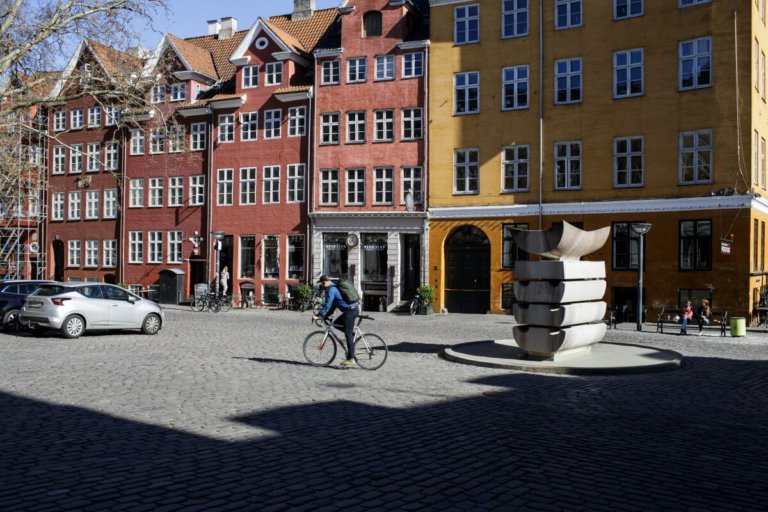
From a design-savvy capital to revitalised smaller cities, Denmark is no longer a sleepy Scandinavian country for the traveller in search of culture, food and history. The country is now a must-go destination for tourists, and with the rise of its universities, an educational hub too.
Cycle down Inderhavnsbroen with impressive panorama, raise a “skal!” (Danish for toast) to new-found friends and find out what the famed test-averse Scandinavian education system is all about. Choosing a Danish university for your higher education could be the start of your most exciting journey yet.
Before you go, here’s some practical information about studying in Denmark:
Denmark 101

Denmark’s Prime Minister Mette Frederiksen arrives for the second day of a special European Council summit in Brussels on February 21, 2020, held to discuss the next long-term budget of the European Union (EU). Source: KENZO TRIBOUILLARD/AFP
This Scandinavian country is currently being helmed by a female prime minister, Mette Frederiksen.
Danish is the national language, but English and German are also widely spoken. As such, you can expect to get by in English. Krone is Denmark’s official currency.
The country is also ranked as one of the top five safest countries in the world and boasts a highly efficient public transportation system.
If you’re studying in Copenhagen, for example, you’ll need to know that the capital is divided into zones and fares depend on how many zones you are travelling through.
Visit Denmark notes that visitors can purchase the Copenhagen Card which will give you unlimited public transport in the city, plus free entry to over 80 museums and attractions. It is available for a 24, 48, 72 and 120 hour period, and costs between 54 euros to 133 euros for adults.
Students can also look into other options including buying a City Pass or using an electric bike to get around the city.
Study at one of the world’s top universities
Danish higher education institutions offer world class study programmes! Two of the Danish universities, @koebenhavns_uni and @AarhusUni are in the top 100 ranked by CEOWORLD Magazine . Well done 🇩🇰👨🎓👩🎓#StudyInDenmark #StudyAbroad #StudyInEuropehttps://t.co/rKg4VTFD6u
— Study in Denmark (@StudyinDenmark) May 28, 2020
International students will find studying in Denmark attractive as many of their courses are internationally recognised and of high quality. Denmark has over 600 programmes that are taught in English.
Some of the country’s top institutions include the University of Copenhagen, Technical University of Denmark, Aarhus University and Aalborg University, which are ranked =81, 112, 145 and =324 respectively in the QS World University Rankings 2020.
The University of Copenhagen is Denmark’s top university.
Students can choose between five types of Danish educational institutions: Universities, University Colleges, Business Academies, Artistic Higher Education Institutions and Schools of Maritime Education and Training.
How much does it cost to study in Denmark?
Study In Denmark – a website run by the Danish Ministry of Higher Education and Science – notes the following:
“Higher education in Denmark is free for students from the EU/EEA and Switzerland and for students participating in an exchange programme. For other students annual tuition range[s] from 6,000 euros to 16,000 euros.”
Do I need a visa?
As a non-EU/EAA citizen, you’ll need a Danish student residence permit in order to study in Denmark.
Can I work part-time while studying?
International students can work part-time while studying in Denmark.
“If you are a Nordic, EU/EEA or Swiss citizen, there are no restrictions to the number of hours you can work in Denmark. As a non-EU/EAA student you can work for up to 20 hours a week while you study in Denmark,” said Study in Denmark.
It’s worth highlighting that it’s not easy to find a student job in Denmark if you don’t speak Danish. Bars, restaurants and workplaces that require special foreign language skills, however, may be good places to look for one.
Can I work after graduation?
International students have the right to work while living in Denmark. You will also have the opportunity to seek full-time employment after graduation 👩🎓👨🎓
Find more information ⬇️https://t.co/vPPwS9gyNuhttps://t.co/pjpDW4MCXS#StudyInDenmark #StudyAbroad #StudyInEurope
— Study in Denmark (@StudyinDenmark) June 2, 2020
Yes, you can!
If you are a non-EU/EEA/Swiss citizen, you will need a residence permit to work in the country.
If you are from Finland, Iceland, Norway or Sweden, you can enter, reside, study and work in Denmark without a visa or residence or work permit.
Study in Denmark notes that EU/EEA/Swiss citizens do not need to apply for a work permit, unless you plan to stay for longer than three months, in which case, you must apply for a registration certificate under EU rules.
Liked this? Then you’ll love…
COVID-19: What are European universities doing to protect students?
International students in Germany can apply for interest-free loans up to 650 euros a month







